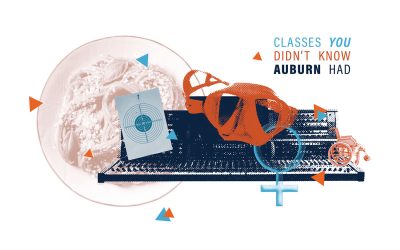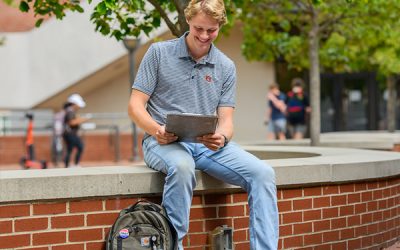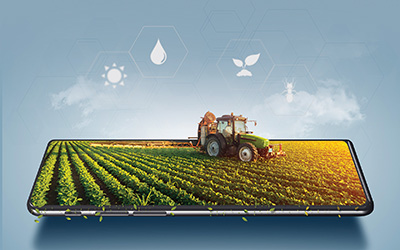For more than 25 years, diversity and inclusion programs across campus have helped underrepresented students and alumni find their place on the Plains
By Todd Deery ’90
WHEN HAYLEIGH HALLAM WAS CONSIDERING COLLEGES in 2016, she looked at things like majors offered, social events and professors. But she also needed something else.
A first-generation college student being raised by a single mother, Hallam (center) was cautious about the transition to college. But in her senior year of high school, she attended a STEM visitation day presented by the Office of Inclusion, Equity and Diversity (OIED) in Auburn’s College of Science and Mathematics and the Engineering Academic Excellence Program in the Samuel Ginn College of Engineering. There, she found what so many underrepresented students want: a home.
“The department [OIED] really highlighted all the resources that were offered, and I felt like I could be supported there,” Hallam said. “And even my mom was sold. She said she knew I would be taken care of at Auburn.”
Auburn’s Office of Inclusion and Diversity (OID) is the hub of many programs at Auburn. Its primary purpose is to accomplish the mission set forth in Auburn University’s Strategic Diversity Plan: establish diversity as a core value at Auburn University. They do this through programming like Tiger Retreat and War Eagle Scholar’s Day, which introduce high schoolers and incoming students to the multicultural aspects of Auburn’s campus, as well as through the Cross- Cultural Center for Excellence which helps ease the transition of underrepresented students to Auburn.
The College of Liberal Arts has two programs that use dialogue and performance to engage and teach. The Mosaic Theater Company is led by Tessa Carr, associate professor of theater, and was started in 2011 to find new ways to encourage dialogue about diversity on Auburn’s campus and in the community. The company performs original performances and is open to all majors.
Two years ago, Joan Harrell, diversity coordinator for the School of Communication and Journalism, and professors Nan Fairley and Julie Bennett created “Becoming the Beloved Community,” an online space for people to share their stories and find their common humanity. The group hosts regular events, including a talk this summer featuring the mayors of Auburn and Opelika and members of the community to find solutions for racial inequality.
Engineering at Auburn offers many opportunities for underrepresented students. Since 1996, the Engineering Academic Excellence Program has provided academic resources and programs to increase the recruitment and retention of marginalized students.
The 100+ Women Strong program aims to do the same for women in engineering. Last year, the program helped increase the percentage of women engineers studying at Auburn and provided $84,000 in scholarships and awards that supported 40 students and faculty.
Diane Sherrard, program administrator for 100+ Women Strong, said this is a program she could have used while in college. “It is incredibly rewarding for me to hear stories of young women who’ve decided to stick with engineering because of encouragement they received from a mentor, or because their scholarship reminds them that someone out there believes in them.”
Now a prepharmacy major heading into her senior year, Hallam is an OIED ambassador and a living example of the benefits of Auburn’s inclusion programs, some of which date back more than 25 years. Across campus, numerous programs are fulfilling the call from President Gogue, who recently said about diversity at Auburn, “We will work together, and we must do better.
Women who want to study at Auburn’s Harbert College of Business also have many great resources. The Women in Business program seeks to create a strong community of students, faculty and staff who promote leadership and professional connections. These development initiatives focus on providing members with the tools and skills needed to become successful business leaders who will influence the diversity and inclusion efforts of their future employers.
The School of Nursing uses travel to help teach cultural lessons. Collaborating with AU Outreach Global, the Harrison School of Pharmacy and the Auburn Social Work program, students conduct free clinics in Ghana, West Africa. The program began in 2017 with an idea from AU Outreach Global to offer free clinics in the Ghanian cities of Sekondi-Takoradi and Cape Coast. In 2020 it evolved into an interdisciplinary program attempting to meet the demands of the clinics and to train students to treat people from different cultures. The program has provided service to more than 3,000 residents, offering free eye exams and eyeglasses, ear exams, blood pressure and complete vital signs screenings, blood glucose screenings, urinalysis, height and weight, patient education and free medications.
“The program changes our perspective and causes us to see the world from a different view,” says Associate Clinical Professor Valarie Thomas. “It causes us to appreciate and value what we take for granted when it comes to our health.”
Helping underserved students discover how agriculture, engineering, technology and natural resources relate to the world around them is the goal of Auburn’s School of Forestry and Wildlife Sciences’ Minorities in Agriculture, Natural Resources and Related Sciences Leadership Institute. The institute hopes to stimulate interest in agriculture, natural resources and related sciences at Auburn and has scholarship programs dedicated for students who study on the Plains.
The opportunities continue long after one graduates. The inclusion and diversity programming at the Auburn Alumni Association (often in collaboration with other campus programs) includes networking events, resources and training on topics like implicit bias. A new Black Alumni Council was formed this summer and will provide a voice on issues relevant to African American alumni. The council got its start from the annual Black Alumni Weekend, where hundreds of African American alumni return to campus to network and mentor current students.
“This council will play an important role in helping to advocate for the concerns of Black alumni and friends, and build connectivity between Black alumni and the university,” said Erin Hutchins, alumni programs coordinator for inclusion and diversity at the alumni association. “This council will not only serve as advocates, but will assist with the recruitment of new students, support the retention of current students and work to preserve the legacy of Black alumni, especially those who paved the way for us to attend Auburn University beginning with Dr. Harold A. Franklin in 1964.”
For Hallam, all these programs come down to one thing: providing a sense of community. “When you are going through challenging times, it’s nice to have a network and community you can lean on.
That’s a Class? Six Unique Classes You Didn’t Know Auburn Offers
From safely shooting a gun to cooking an excellent meal, these unique and often overlooked classes in Auburn’s curriculum may surprise you.
What Do Students Carry In Their Backpack?
This ever-present functional accessory is more than a carrier of books, it’s also an expression of a student’s personality, lifestyle and even goals.
Artificial Intelligence and Auburn University
The future of machine learning is less about robots becoming sentient and more about helping humanity grow better crops or deliver a hotter latte. Auburn researchers are at the forefront of showing how AI will integrate into our everyday lives, one line of code at a time.
That’s a Class? Six Unique Classes You Didn’t Know Auburn Offers
From safely shooting a gun to cooking an excellent meal, these unique and often overlooked classes in Auburn’s curriculum may surprise you.
What Do Students Carry In Their Backpack?
This ever-present functional accessory is more than a carrier of books, it’s also an expression of a student’s personality, lifestyle and even goals.
Artificial Intelligence and Auburn University
The future of machine learning is less about robots becoming sentient and more about helping humanity grow better crops or deliver a hotter latte. Auburn researchers are at the forefront of showing how AI will integrate into our everyday lives, one line of code at a time.


